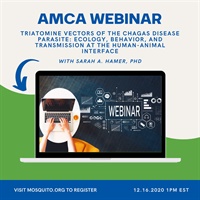Triatomine Vectors of the Chagas Disease Parasite: Ecology, Behavior, and Transmission at the Human-animal Interface
- Average Rating:
- Not yet rated
- Categories:
- Webinar Archive
- Faculty:
- Sarah A. Hammer, Ph. D.
- Course Levels:
- All Levels
- Duration:
- 1 Hour Session
- Format:
- Audio and Video
- License:
- Never Expires.
Description
Learning Objectives:
- Introduction to triatomines (kissing bugs) and Chagas disease
- Kissing Bug Community Science Program
- Triatomine behavior- in nature, in the lab
- Epidemiology studies of naturally-infected animals
AMCA Members - This archived webinar along with all AMCA webinars is available free to our active members. We are currently syncing this new system with our database to have seamless identification of our members, but until that is finalized you can access all webinars (live and archived) for free using our membership code which can be found in our member portal here.
Faculty
Sarah A. Hammer, Ph. D. Related Seminars and Products
Dr. Sarah Hamer is an Associate Professor of Epidemiology in the College of Veterinary Medicine & Biomedical Sciences (CVMBS) at Texas A&M University. She runs a research lab focused on the ecology and epidemiology of diseases that emerge at the human-wildlife-domestic animal interface. She holds the Richard Schubot Endowed Chair and directs the Schubot Center for Avian Health to oversee avian research initiatives in the College. Dr. Hamer is an active mentor in the Ecology & Evolutionary Biology interdisciplinary program. She trains undergraduate, graduate, veterinary, and public health students, and teaches epidemiology and a field-based course in wildlife sampling and vector collections. Her MS is from University of Illinois in Environmental Science, where she tracked wild American Crows to study the impact of West Nile virus. Her PhD (Fisheries and Wildlife and Ecology/Evolutionary Biology & Behavior) is from Michigan State University, where studied wildlife sentinels of emerging tick-borne diseases. She also completed a veterinary degree from Michigan State University. In 2016 she became board certified in the American College of Veterinary Preventive Medicine (ACVPM) and now serves as the President of the Epidemiology Specialty of ACVPM. Her research is currently funded by diverse sponsors including the NIH, DOD, Dept. Homeland Security, CDC, and more, and she has >90 peer-reviewed publications. She leads several research initiatives, including ecological interventions to break the cycle of Chagas disease transmission, citizen science approaches for vector-borne disease management, and new studies of household transmission of SARS-CoV-2 among domestic animals. She has been recognized with the Montague Teaching Fellowship, Outstanding Mentor Award (CVMBS), Outstanding Young Investigator Award (CVMBS), and the Richard Davis Teaching Award (CVMBS). Her trainees likewise have earned several distinctions, with two of her PhD graduates being recognized with TAMU’s top graduate honor, the AFS Distinguished Graduate Student Award for Research.
